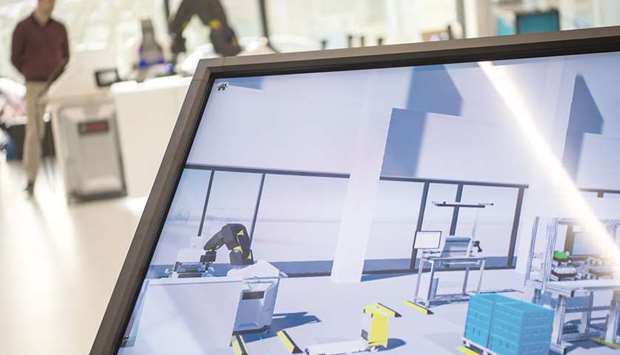Dust, oil and sawdust used to be part of daily life for employees at German machine tool maker and laser technology specialist Trumpf. Not anymore. At the company’s Stuttgart factory, a large metal plate glides across the floor in a self-driving pallet, as if led by an invisible hand. The halls are large, bright and noticeably clean - the human workers don’t need to haul around sheets of metal or work heavy levers, but instead pace calmly between monitors as they watch over production.
Across south-western Germany, Trumpf and many other medium-sized companies and major corporations have long been working on digitalising their factories.
The change is being driven by far more than cleanliness and the savings generated by fewer workers - smart factories are at the heart of Industry 4.0, the fourth industrial revolution.
The businesses’ goal is to digitally connect the entire production line, with every part of the process depicted on a monitor or tablet. Programmed accordingly, the production lines could then organise themselves: The various building materials would be detected and processed on the line, the systems would report and repair errors, and materials would be automatically ordered if supplies were running low.
In a factory of automation specialist Pilz, a workpiece carrier, with the help of a chip, automatically solders and assembles circuit boards. “Digitalisation is not an end in itself,” says Pilz director Susanne Kunschert. “People should be able to work more efficiently, safely and easily with the new technology,” she adds.
However, the fear that automation will take away jobs is a hard one to shake. How expendable are people when the robots take their jobs? “The same old phrases and placations don’t help anyone who is really worried about losing a job,” says Kunschert. “We are in the midst of changes that will have profound effects on society.”
Fears about employment are justified, a study in April from the Nuremberg Institute for the Labour Market and Job Research showed. According to the study, the digitalisation of the economy will have only a slight effect on the overall level of employment through 2035, but it will nonetheless lead to huge upheavals in the jobs market. The state’s industrial and business chamber sees huge challenges ahead for companies and their employees, especially since many businesses are already having trouble finding workers.
Chamber president Wolfgang Grenke argues that continuing education must receive far more support, especially amid the high demand from companies for skilled labour. At the same time, digitalisation doesn’t always make sense for every business, he says.
“We will experience different streams - brand-new business models as well as companies that, with the help of digitalisation, can simply make their systems more efficient.”
Germany’s conglomerates, meanwhile, are concentrating their resources into projects such as Arena 2036, a university-backed research project in Stuttgart that focuses on the digitalisation of the car industry.
They are investing in the digital skills of these employees from the get-go, for example at Daimler, where trainees learn to weld with the aid of technology, wasting no materials as the computer analyses the quality of their weld accurately to the millimetre.
Bosch is also using networked solutions: Robots weld, adhere, mount and transport components, but humans steer, observe and maintain the production, the company says.
“People are the creative heads, the link between machines and data,” says Rolf Najork, head of Bosch Rexroth, which specialises in drive and steering technology.
The need for people, despite technological developments, is clear at the factory where Trumpf’s stamping tools are made. There, the company has managed to save dozens of jobs with the help of digitalisation - by offering shorter delivery times. If a customer orders a tool before 2pm online, it is automatically produced and sent out from the factory the same day.
“Essentially, customers start and steer our production,” says Trumpf manager Alexandra Gleich.– DPA

DIGITALISATION: A digital factory floor plan seen at Stuttgart University, part of the Arena 2036 university-backed research project focusing on the digitalisation of the car industry.
